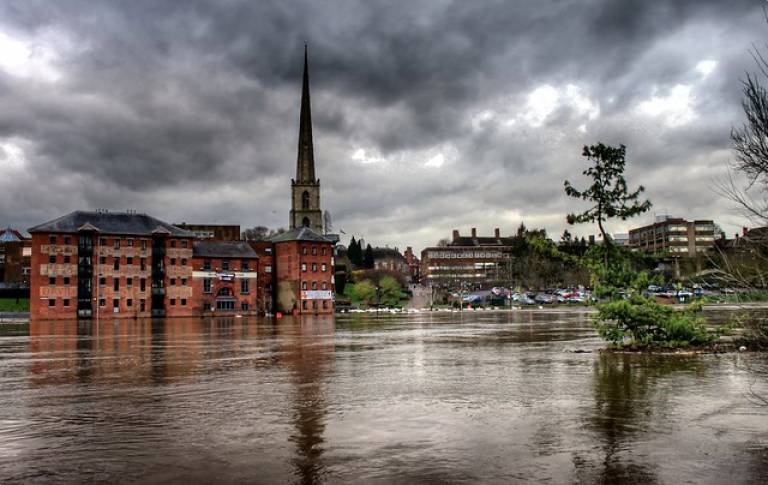UCL empowers climate scientists to guide policy making
30 July 2019
Seven early-career researchers from universities across the UK have been trained to guide policy makers more effectively on the risk of flooding from climate change.

The pilot training programme was designed and run by members of the UCL Policy Commission on the Communication of Climate Science. Its goal was to equip researchers with the tools and techniques to develop and present their scientific knowledge in ways relevant to policy and decision-making.
Essential skills for the modern climate scientist
The ultimate aim of the initiative is to ensure the value of climate research can be put to use more effectively for the benefit of society.
“Engaging effectively with different stakeholders requires experience and skill,” explained Professor Chris Rapley from UCL Earth Sciences. “These brokering skills are challenging to develop in competition with the other requirements of a research career. Few formal training opportunities exist.”
Chris recently provided scientific advice to the production team of the BBC programme Climate Change – The Facts. He said a cultural change within the climate science community is needed, “to encourage and reward researchers to become champions of their science to non-scientific ‘user’ communities.”
Focus on flooding risk
One of the most immediate and significant ways in which climate change is impacting society is the accelerated water cycle. A warmer atmosphere transports higher quantities of water vapour, leading to more intense downpours and a greater risk of flash flooding.
The UK Climate Change Committee has warned the UK government that its current planned measures and strategy fall short of what’s required to adequately increase the UK’s resilience to flooding. A substantial increase in the engagement of specialist climate scientists with flood protection decision-makers and policymakers will be needed to ensure progress. This project addressed the lack of formal training for climate scientists to fulfil that role.
Researchers learn digital storytelling techniques
The three-day residential programme, supported with HEIF funding from UCL Innovation & Enterprise, included training in state-of-the-art digital storytelling techniques. Communications tools from leadership training in the corporate sector were also explored, along with experiential and creative teaching methods.
Researchers also had the opportunity to interview policy experts in informal but structured settings.
At the end of the training, the researchers had four weeks in which to organise an event to present their science in a relevant way to 20 invited policy makers.
Scientists share lessons learned through early career network
The trainees were sufficiently inspired by the course to establish an ‘early career network’ to sustain and extend their new skills and insights.
“The researchers feel highly empowered to continue their work in this area,’ said Chris. “They’re keen to develop themselves as the next generation of climate change knowledge brokers.”
Commenting on the course, one of the trainees said: “Prior to this, my only experience in policy communication was academic. The combination of approaches got me thinking more about how to bridge the gap in communication and understanding between climate science and policy. This was hugely valuable in allowing me the opportunity to engage more effectively with policy makers.”
Funding
This project was supported with funding from the Higher Education Innovation Fund (HEIF).
Find out more about Innovation & Enterprise knowledge exchange funding (including HEIF funding).
Links
Find out more about:
Image
Flooded river Severn, Worcester, UK, November 2012 by Muffinn. Licensed under CC BY 2.0.
Read more news from UCL Innovation & Enterprise.
 Close
Close

